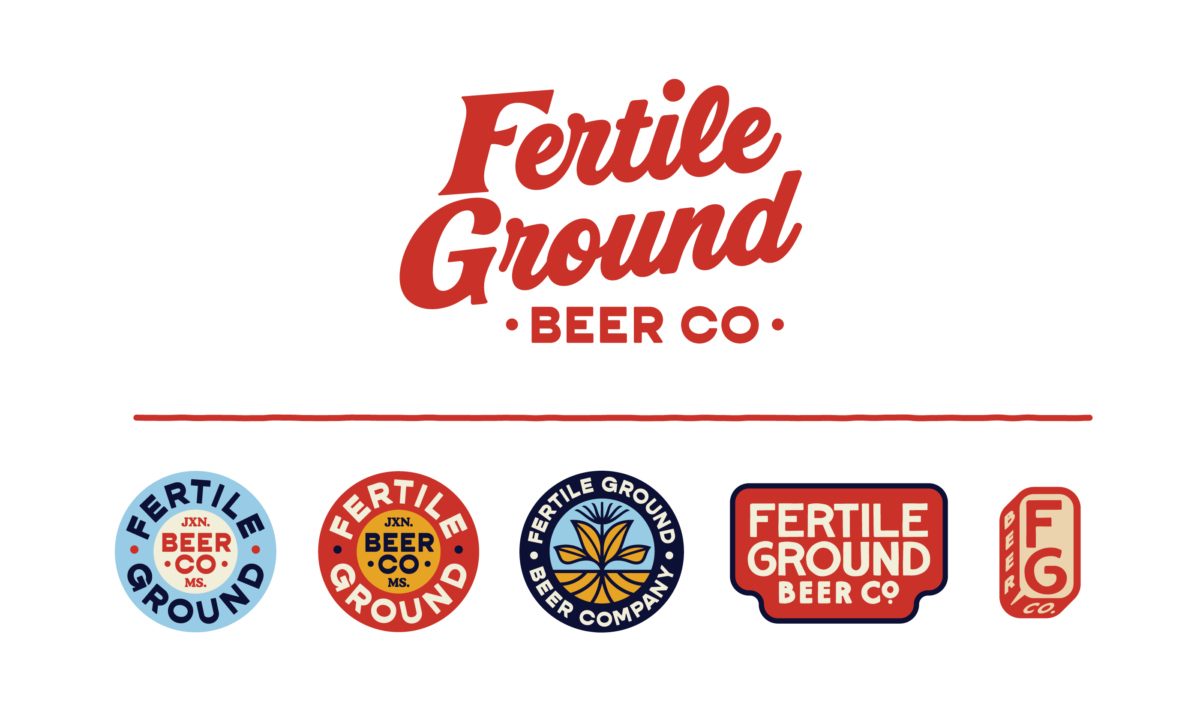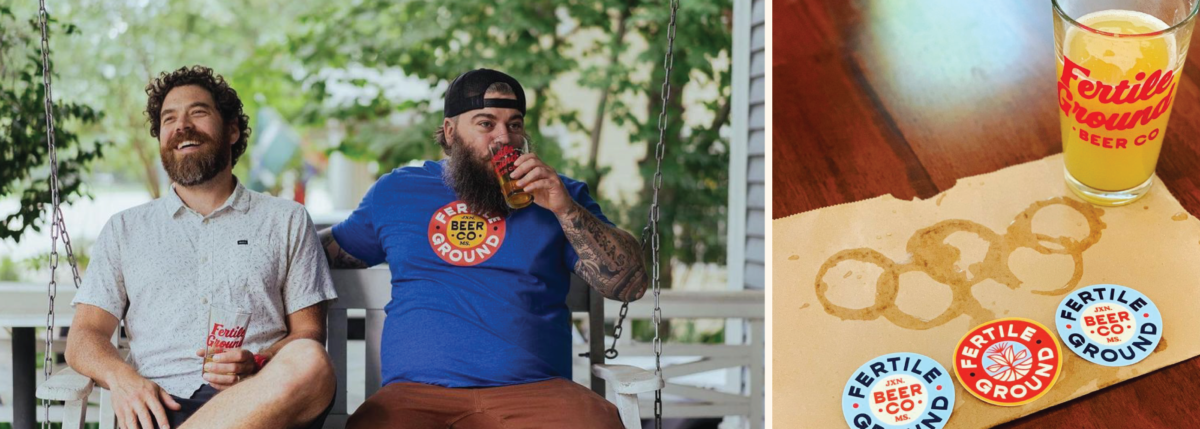Resources
When a Lawyer Opens a Brewery
Important Intellectual Property Advice For New Breweries
Trademarking and Intellectual Property (IP) continues to be a blindspot for many new breweries. And this can lead to some serious heartache if overlooked.
Matthew McLaughlin has the distinction of being both a CODO client and partner. We work with his firm regularly when naming new beverage companies, and recently, got to help him brand his very own brewery, Fertile Ground Beer Co.
Matthew is a tremendous resource and and leading voice in beverage IP. If you’re here for some quick and dirty advice on naming (and protecting) your brewery name, scroll down to the halfway point of this piece. And if you’re starting a new brewery or beverage company right now, read on the learn about Matthew’s experience on this front and how their team has had to stay flexible during the pandemic.


Hi, Matthew. I think a lot of people reading this will already know who you are, but they might not know that you’re currently opening a brewery in Jackson, Mississippi. Please introduce yourself, McLaughlin, PC and Fertile Ground Beer Co.
 Matthew
Matthew
Sure thing, my name is Matthew McLaughlin and I am the founding attorney of McLaughlin, PC, a boutique law firm that provides legal services and government relations to entrepreneurs and innovators operating in regulated business environments. The firm serves clients in the alcohol beverage, food product, and cannabis industries throughout the United States and beyond. We advise clients on regulatory matters, corporate structure and finance, trademark and intellectual property, and labor and employment issues.
So, practicing law is, and will remain, my day job. Outside of the practice of law, I have been working with a team of talented people to bring a brewery to my hometown, Jackson, Mississippi. Even though I have worked in the beer industry for almost 20 years now, I never envisioned or conceived of starting a brewery. Fertile Ground is the manifestation of the availability of a compelling space, a team of people with a shared vision, and a desire to provide Jackson with locally made beer.

Tell us about Fertile Ground Beer Co. What kind of beer and experiences can people expect? What’s your grand vision?
 Matthew
Matthew
Fundamentally, Fertile Ground will exist to cultivate community as a third space. Third space is a sociocultural term to designate communal space, as distinct from the home (first space) or work (second space). We (the founding team) recognize a need for this in Jackson, a place to gather and socialize, while incorporating our passion for craft beer.
With respect to the beer and other products we are going to manufacture and sell, Fertile Ground will be a progressive and innovative craft brewery creating bright, clean, and contemporary beer utilizing traditional brewing techniques.
In the Southeastern United States, we spend a lot of time outdoors and it can get hot down here. In this context, we are going to offer crisp lagers and ales that people can enjoy fishing, at the beach, at a musical festival, a cookout or even a crawfish boil. We will also lean into the hazy craze, create different year-round rotating series, and offer seasonal beers.


Has the pandemic shifted how you plan to go-to-market in any way?
 Matthew
Matthew
Absolutely, especially as it relates to the space planning process. We are designing an indoor space and outdoor space that allows people to connect in a meaningful way if they feel comfortable doing that, but also allows for people to create space from others if they feel more comfortable in less crowded environments.
We are also working on creative ways to maximize on-site sales through delivery, curbside pick-up, and online ordering.

You live and breathe Intellectual Property every day, but I’m still curious, what part of the IP process did you personally find challenging when working through Fertile Ground’s filing?
 Matthew
Matthew
Yes, we do a significant amount of intellectual property work, everything from trademark registration and monitoring to patent licensing. We did not have any real challenges with the application for registration of “Fertile Ground Beer Co.”, but I do have a newfound respect for our clients that are really good at coming up with unique beer names.

After opening your own brewery and wrestling with all the trademarking work, have any of your previous recommendations for new clients changed?
 Matthew
Matthew
Not at all. We still advise clients to register a trademark for the name of their brewery and their flagship beers. We also advise clients to monitor for any unauthorized use of their marks and to take appropriate actions to prevent such use.


Build a stronger brand.
Sell more beer.
Join 7,500+ other beer industry folks and sign up for our monthly Beer Branding Trends Newsletter.

Beer Branding Trends 2.0

Let’s start with one of the most common issues a new brewery will run into. How can you guarantee a name is available for trademark?
 Matthew
Matthew
I am not sure there is a way to guarantee a name is available. We have a clearance process that works really well, but at the end of the day, you are subject to the review, opinion, and decision of an examining attorney with the USPTO. This means there is a human element and subjectivity involved in the process, which can lead to differences of opinion. Notwithstanding, we are fairly successful in helping our clients land on names for their breweries or their beers that will ultimately mature into registered trademarks.
Here’s a few tips. While not a guarantee, coming up with arbitrary, made-up names is a good start. Or at the least, using a word or words that have not been used on alcohol or other beverage products or related goods and services. Also, avoid using a person’s name or likeness, or using a geographic term as the primary word in your trademark.

We’ve seen breweries that have used a name (corporate or a specific beer) for years without ever trademarking it who run into trouble when another brewery files for federal protection for the same name. Can you explain Common Law vs Federal trademark protection and give us a few scenarios of how this situation could play out?
 Matthew
Matthew
Sure, in the United States, we have a bifurcated system when it comes to certain forms of intellectual property. Generally speaking, if a business uses a word mark or a logo in commerce, without doing anything further, it will accrue common law rights in the mark. These common law rights have some value, but that value typically only extends throughout the geographic area in which the goods and services are being sold by the user.
If a business wants greater protection of its marks, it can file for federal registration, a measure that carries significant benefits, namely the ability to use the mark anywhere in the United States. We advise our brewery clients to register the name of their brewery and flagship beers.

If you can’t get federal protection for a corporate name, should you move on to something else that allows you to do so? Is that option dead in the water, or, not a big deal?
 Matthew
Matthew
The name of the corporate entity is not necessarily the important name here. For example, our corporate name is “FGBC, LLC” but the brewery is going to do business as both “Fertile Ground Beer Co.” and “Fertile Ground Beer Company.” The important name in this situation is the name the business is going to do business as and not necessarily the corporate name.
But if the name of your brewery or distillery is already being used by someone else, or is very similar to another name currently in use, it may be better (and less expensive) to start thinking of another name. It can be difficult to walk away from a name you’re in love with, but sometimes it is worth pivoting early to save a lot of money, headache, and customer confusion later on if you aren’t able to secure a registration for that trademark.
Those are hard conversations we have with our clients, but ultimately it is better to address it early than after a client has invested thousands of dollars around a brand they can’t use.

Devil’s Advocate for a moment—do you need a federal trademark if you’re planning to start a small taproom-focused brewery or brewpub?
 Matthew
Matthew
We believe so. The concept of interstate commerce, which is a condition of federal registration, is fairly broad. We advise even the smallest (and mightiest) of our clients to register their brewery name. Having a registered mark can also be more attractive to investors and potential buyers of your business, as many don’t want to inherit legacy risk. Securing your trademarks makes your company more marketable and is just a good business practice, regardless of size.


Can you tell me about the secondary registry? I see this come up from time to time (usually when someone wants to include a city or town in a trademark) and I’m curious how it works and what protections it provides?
 Matthew
Matthew
There are two separate trademark registers, the principal register and the supplemental register. The principal register provides greater benefits and is only available for marks that are distinctive.
Non-distinctive marks, those marks that may be merely descriptive, can seek registration on the supplemental register. A supplemental registration does not provide some of the presumptions available to principal registered marks, but it does allow the holder to bring suit in federal court and use the ® notice.

What’s the difference between a Logo and a Word Mark?
 Matthew
Matthew
A logo (design mark) and a word mark are two different types of trademarks. In the general sense, a word mark is just the plain words themselves, without any style, color, or imagery. Think just the words “Coca-Cola”. This provides you exclusive rights to use this mark on your goods and services, regardless of how it appears. A design mark would be the words “Coca-Cola” in a particular font/color or displayed in a certain graphical way. These are two separate trademark registrations and seeking both can be advantageous depending on how the marks are going to used. Often we see breweries file for word marks first and then a design mark later if needed.

Is there a difference between a Copyright and a trademark?
 Matthew
Matthew
A trademark protects a word, phrase, symbol or device that is used in commerce to identify and distinguish one product from another. Trademarks are intended to prevent consumer confusion and act as an identifying source of good or services.
Copyrights, on the other hand, protect original artistic works. That includes things like photos, books, movies, songs, and paintings. Copyrights give the owner the exclusive right to reproduce and profit off the underlying work.

If I have a name that I want to use for my brewery, but I’m currently a long ways out on planning (2+ years until opening), when should I begin the trademarking process?
 Matthew
Matthew
If you are 2 years out, we advise clients to file intent to use applications. These applications can act as a placeholder for a trademark that is not being used in commerce yet. Trademark rights are based on use, but the federal registration system allows applicants to file intent to use applications if there is a bona fide intent to use the mark in commerce at some point in the future.

If a brewery wants to trademark its name now, but knows that it will eventually be expanding into RTD cocktails, seltzers, and a myriad of other non-beer beverages, does that affect which classes you suggest they move to protect? How can a brewery ensure it’s able to extend its brand into other categories (assuming that’s a strategically-sound move)?
 Matthew
Matthew
For breweries, we always start with International Class 032, beer, and International Class 043, taproom services. We have seen clients get bad advice or file their own application in International Class 040, brewing of beer. This would be the appropriate class of services for a company that is in the business of brewing beer for others, but not necessarily the right class for a brewery.
From there, if the brewery wanted to get into RTDs or seltzers, International Class 033 provides protection for other alcohol beverage products that are not beer. This class would be appropriate for many RTDs and seltzers.
As soon as a client thinks they will be expanding into new product lines or services, we advise going ahead and filing a 1B.

What is Trade Dress?
 Matthew
Matthew
Trade dress is the commercial look and feel of a product or service that identifies and distinguishes the source of the product or service. It includes the various elements (such as the design and shape of materials) used to package a product or services. So, for a brewery, trade dress includes can, bottle, and other package designs.

With so many predominant styles in beer packaging—“bifurcation,” “nostalgic regional,” “minimalist”—how do you think about Trade Dress protection. Is this even worth pursuing in beer?
 Matthew
Matthew
Frankly, we do not see a lot of trade dress issues with our alcohol beverage clients right now. I could see this changing as more and more breweries are moving in the direction of minimalist and nostalgic designs.

Or to ask that question from another angle, packaging is something that will likely be refreshed every so often. Do we need to worry about Trade Dress if we know that that routine packaging revamps will occur?
 Matthew
Matthew
I think all breweries and other alcohol beverage manufacturers need to be aware of trade dress and understand the concept. There are not a lot of clearly defined parameters of trade dress and it can be difficult to describe. To steal a quote from Supreme Court Justice Potter Stewart in the seminal case of Jacobellis v. Ohio, “I know it when I see it.”


Is there any way to guarantee that a logo you’re trademarking is completely unique? We’ve had clients ask us this in the past and our best answer is that we make everything as custom and tailored to their business as possible, but cannot guarantee that there won’t be something out there in the world that looks similar. Do you have any thoughts on this from a legal perspective?
 Matthew
Matthew
There are no guarantees with anything. We exist in the grey.

Do you have any book / podcast / newsletter resources that other brewery founders should check out?
 Matthew
Matthew
I religiously listen to the BrewBound Podcast and the BevNet Taste Radio podcast. The BrewBound podcast is a great resource for what is going on the beer industry, whereas Taste Radio is a fabulous podcast focused on the global food and beverage industry. I also like Harvard Business Review’s IdeaCast and the Entrepreneurial Though Leaders podcast that is put out by Stanford’s business school.
Finally, this is self serving as hell, but who cares. The founding team of Fertile Ground Beer Co. has a podcast called Cultivating a Craft that is documenting the development of the brewery from inception through opening.

Beyond those, how do you stay sharp and up-to-date on emergent trends within craft beer?
 Matthew
Matthew
I read everything I can get my hands on, from Brewers Association publications and economic data to industry blogs and websites. With our law practice, we strive to know more about the beer industry than our clients. If we do, we are an asset and not necessarily an expense.

Where should people go to follow you and/or Fertile Ground Beer Co.?

Thanks so much for your time, Matthew. This has been great!
 Matthew
Matthew
I really enjoyed catching up with you guys and we are so grateful for all of the wonderful work you have done for us with Fertile Ground and the podcast. Cheers!

Build a stronger brand.
Sell more beer.
Join 7,500+ other beer industry folks and sign up for our monthly Beer Branding Trends Newsletter.
